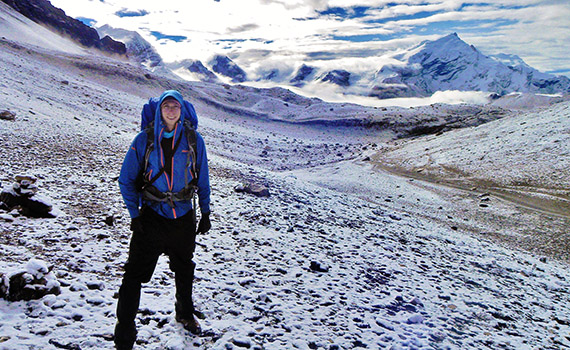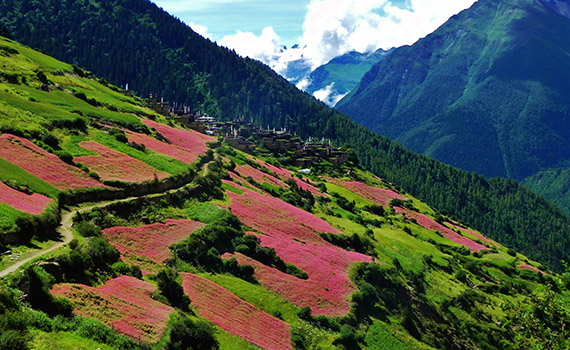
Eric Taber ’13 on his 124-mile trek to study impacts of road development in a conservation area in Nepal.
Eric Taber ’13 imagined that a trek through the sprawling Annapurna Conservation Area of Nepal (ACA) would be the best way to study the impact of ongoing road development in the region. Thanks to his Alumni Memorial Scholar fellowship, he was able to go there himself.
Taber, a biology and geography major from Cincinnati, Ohio, spent more than two weeks trekking 124 miles with his Nepali guide and translator. Their journey ranged from low-lying tropical areas to alpine elevations of 18,000 feet. Along the way, Taber interviewed more than 60 people about new road construction cutting through the ecologically diverse region.
“I was interested in learning about the locals’ perceptions of the construction and the implications that it might have on the conservation in that area,” Taber said. “It really fits nicely as a case study.”
Taber and all students selected for the AMS program are eligible to apply for a fellowship of up to $5,000 for research or to facilitate academically meaningful internships or experiences beyond the formal curriculum at Colgate. For Taber, the scholarship was the deciding factor in his coming to Colgate.
According to Eddie Watkins, assistant professor of biology, Taber is is one of the most broadly interested and focused students he has known in his time at Colgate.
“Indefatigable would describe him well. Eric has been a steadfast member of my lab research group, even when his interest has moved to issues more socio-environmental. Indeed, he first started in my lab looking at the impacts of an invasive species on an endangered plant,” said Watkins, who is Taber’s academic adviser.
While talking with locals on the trail, Taber said he found the issues in Nepal’s ACA area to be more nuanced than just economic impacts to the trekking industry. Road development opens up increased access to services such as medical care, and farmers can reach more markets in larger population centers. However, ecological impacts include new dam construction on the rivers and the emergence of truck traffic.
“Even the tea house workers weren’t strongly opposed to the road because they recognized some of the benefit,” Taber said. “Even those that are struggling financially, those talking about having to close their tea house are very aware of the benefits that the road is bringing to others in the community.”
Taber is back on campus now, and deciding where to apply for graduate schools. He is a member of the campus Sustainability Council, and last summer also traveled to Siberia to study climate change.
“He certainly has a brilliant future ahead of him…,” Watkins said. “He has been a wonderful colleague these last 4 years.”
